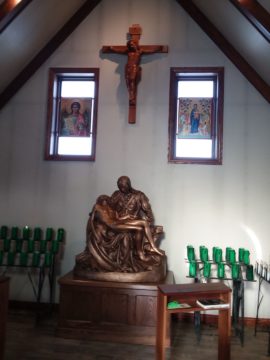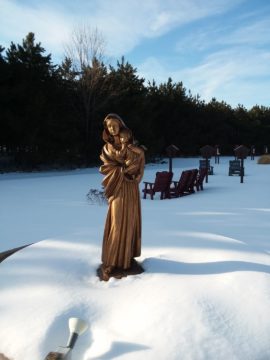As we anticipate the First Sunday of Lent, please find a Franciscan Gospel reflection and questions written by Fr. Paul Gallagher, OFM for your prayer. They are edited by Franciscan Sister of Christian Charity Sister Anne Marie Lom and Joe Thiel. The excerpts from the Sunday readings are prepared by Joe Thiel. To read or download the complete pdf with excerpts for your prayer, please click here:Franciscan Gospel Reflection March 1 2020. Excerpts are from the Lectionary for Mass for Use in the Dioceses of the United States of America, second typical edition © 2001, 1998, 1997, 1986, 1970 Confraternity of Christian Doctrine, Inc., Washington, DC. Used with permission. All rights reserved. No portion of this text may be reproduced by any means without permission in writing from the copyright owner. Photos: Curran Spirituality Center, Curran, WI
Matthew 4:1-11
At that time Jesus was led by the Spirit into the desert to be tempted by the devil. He fasted for forty days and forty nights, and afterwards he was hungry. The tempter approached and said to him, “If you are the Son of God, command that these stones become loaves of bread.” He said in reply, “It is written: ‘One does not live by bread alone, but by every word that comes forth from the mouth of God.'”
Then the devil took him to the holy city, and made him stand on the parapet of the temple, and said to him, “If you are the Son of God, throw yourself down. For it is written: “’He will command his angels concerning you’ and ‘with their hands they will support you, lest you dash your foot against a stone’.” Jesus answered him, “Again it is written, ‘You shall not put the Lord, your God, to the test.'”
Then the devil took him up to a very high mountain, and showed him all the kingdoms of the world in their magnificence, and he said to him, “All these I shall give to you, if you will prostrate yourself and worship me.” At this, Jesus said to him, “Get away, Satan! It is written: ‘The Lord, your God, shall you worship and him alone shall you serve.'” Then the devil left him and, behold, angels came and ministered to him.
Background:
For several weeks the gospels have presented Jesus pulling the disciples away from the crowd so he could invite them into a deeper understanding of what it means to be a disciple. This instruction is commonly known as the Sermon on the Mount. (Matt 5:1-7:29) In the gospels for the past two weeks, Jesus has invited his disciples to think of their relationship with Yahweh not only as external observance of their traditions, but also adopting the attitudes and values that underlie that behavior.
With the beginning of Lent, the Gospel departs from the Sermon on the Mount and Jesus’ instruction of the disciples. The gospel for the first Sunday of Lent each year presents an account of Jesus being tempted in the desert. The second Sunday of Lent has an account of the Transfiguration. This year that text comes from Matthew 17:1-9. The next three gospel texts will be taken from John’s gospel and, in order, they will present Jesus as fountain of life, light of the world, and life of the resurrection. John 4:5-42 tells of the Samaritan woman at the well; John 9:1-41 covers the curing of the man born blind; and John 11:1-45 is about the raising of Lazarus. The last Sunday of Lent is Passion Sunday. That gospel will be from Matthew 26:12-27:66.
As Matthew presents the sequence of events, Jesus’ temptation follows after his baptism by John in the Jordan (Matthew 3:13-17). Matthew describes Jesus coming out of the water and “God descending like a dove and coming upon him. And a voice comes from the heavens, saying ‘This is my beloved Son, with whom I am well pleased.’” (Matt 3:16-17) Matthew then describes Jesus being led by the spirit into the desert to be tempted. The description of Jesus’ temptation is the gospel text for this Sunday.
Matthew’s community assumed the presence of evil in ways that most modern readers might dismiss as naive or even fanatical. They believed that there was an abundance of evil spirits whose main pastime was interacting with humans, sometimes with a surprising blessing, but more often with ill intentions. In order to ward off the ill effects of these spirits, people relied on objects and ritual actions and prayers that were believed to have protective powers. This spirit world also enjoyed its own way of communication and being connected, so that anything that happened was in part known by other spirits. That fact that God had spoken of Jesus that “this one was his beloved Son with whom he was well pleased” would naturally draw a response from others in the spirit world. Other spirits would want to know if Jesus was indeed worthy of such praise, and tempt him in such ways that he might lose his favored status.
For the people of the day it is not a surprise that following the baptism Jesus is tempted/tested. What is surprising is that Jesus does not rely on any of the things that they would have used to protect them from the powers of the spirit world. Even after he has fasted for forty days, and is hungry and vulnerable on many levels, Jesus faces His tempter unaided.
Matthew is also making use of the community’s familiarity with the events of the Exodus from Egypt. All the responses of Jesus to the temptations are quotations from the description of Israel’s wandering in the desert as recorded in the book of Deuteronomy (8:3, 6:16 and 6:13). Jesus’ temptation and the exodus both take place in the desert, the place normally associated with the evil spirits. The people would also recognize that Israel spent 40 years in the desert, and Jesus has been fasting in the desert for 40 days and 40 nights. Matthew is building a connection between the experience of their ancestors in faith and the experience of Jesus.
Matthew also rearranges Luke’s account of the temptations so that the last temptation places Jesus on a very high mountain. Mountains were places of revelation, and the story of Moses’ encounter with God on the mountain is familiar to everyone as Matthew describes Jesus’ last encounter. (Next week, Matthew’s gospel will again place Jesus on a high mountain, with three of the disciples, for the transfiguration. Matthew’s community knew well the tradition that the mountain was the place where God revealed the relationship God desired to have with them as the chosen people.)
Reflection Questions:
1. What is your experience of fasting? How does it affect you physically, emotionally, and spiritually?
2. For what do you hunger? For what do you thirst? How might that help you to hear what this gospel is saying to you today?
3. In the third temptation the devil says that he will give Jesus kingdoms of the world if he will worship him. Do you think that people of Jesus’ day experienced daily life as though it were ruled by evil? Do you experience it that way? What does Jesus’ response say?
4. Jesus is tempted to use his status as beloved Son of God for his own purposes. He refused to use his status as beloved Son of God. What does that say to you for your Lenten journey?
5. Can you take some time to talk to God honestly about how you would like to use this Lent, or about anything that came to you as you reflected on this gospel, or perhaps about your own struggle with temptation?




